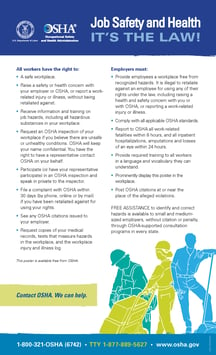New laws, regulations and ever-changing filing deadlines can make year-end a challenge. We’ve made it easy with a checklist of a few important HR tasks, related to payroll, benefits and compliance, to help small businesses prepare for the coming year.
PAYROLL
 Audit Employee Records. Year-end is a good time to review and update your employee records, including Form I-9. Make sure inactive employees are termed in the system and full-time employees are correctly classified as full-time.
Audit Employee Records. Year-end is a good time to review and update your employee records, including Form I-9. Make sure inactive employees are termed in the system and full-time employees are correctly classified as full-time.
Prepare W-2 and W-3 Forms. Remind employees to update their personal data by December 31, 2018. Employers must file W-2 and W-3 forms by Thursday, January 31, 2019.
Prepare Forms 1096 and 1099-MISC. If your business paid independent contractors or freelancers in 2018, you must file IRS Form 1096 and 1099-MISC by Thursday, January 31, 2019.
Prepare FUTA Form 940. The Federal Unemployment Insurance (FUTA) tax applies to the first $7,000 you pay to each employee during a calendar year after subtracting any payments that are exempt. FUTA Form 940 is due to the IRS by January 31, 2019.
BENEFITS
Calculate FTEs and Prepare ACA Reporting. Under the Affordable Care Act (ACA), the responsibility for affordable healthcare coverage is shared and reporting requirements depend on the number of full-time employees (FTE). Review the requirements for large and small companies to determine the type of information your business is required to submit and if you need to calculate your FTEs.
Prepare Forms 1094-C and 1095-C. Applicable employers must file IRS Forms 1094-C and 1095-C for each FTE and provide 1095-C statements to employees. In the past, the IRS accepted and processed tax returns without health coverage information. That’s no longer the case. For the 2018 tax season, the IRS will not accept electronically filed tax returns without information on health coverage, exemptions and shared responsibility payments. On November 29, 2018, the IRS extended the deadline for employers to submit Form 1095-C by March 4, 2019.
Prepare a Health Plan Summary. Prepare and distribute a summary of your employee health plan to current employees and offer to new employees within 90 days of initial coverage.
Prepare an Employee Benefits Report. Applicable employers must file Form 5500 if on the first day of an ERISA plan year (which is different than the policy year) 100 or more participants are enrolled in coverage. In addition, health and life insurance and retirement plans require businesses to provide enrollment figures and balances before the end of the year. Follow up with your carrier to determine if there are any changes in reporting and deadlines.
COMPLIANCE
 Check OSHA Record Requirements. The Occupational Safety and Health Administration (OSHA) mandates that all employers, who are required to maintain a log (OSHA Form 300) of work-related injuries and illnesses, must post a summary of the previous year’s log between February 1st and April 30th each year -- even if there were no incidents in the preceding calendar year. The summary (OSHA Form 300A) must be certified by a company executive and placed in a visible location where employee notices are customarily posted.
Check OSHA Record Requirements. The Occupational Safety and Health Administration (OSHA) mandates that all employers, who are required to maintain a log (OSHA Form 300) of work-related injuries and illnesses, must post a summary of the previous year’s log between February 1st and April 30th each year -- even if there were no incidents in the preceding calendar year. The summary (OSHA Form 300A) must be certified by a company executive and placed in a visible location where employee notices are customarily posted.
Employers, with more than ten employees, are covered by this requirement unless they qualify as part of an exempt low-risk industry. A full list of industries exempt from OSHA's routine record-keeping requirements (including posting Form 300A) can be found in the guides section of the HR Support Center by searching OSHA 300 exempt industries.The OSHA log of work-related injuries and illnesses (Form 300), summary (Form 300A) can be found in the forms section of the HR Support Center by searching for OSHA Form 300.
Update Your Employee Handbook. Review your company’s policies and procedures to ensure you are in compliance with new laws. Make sure your employee handbook includes standards for conduct, policies for communication and privacy, compensation and performance reviews, social media, attendance, break periods, benefits, company-observed holidays for 2019, and procedures for termination, discipline, workplace safety, sexual harassment, inclement weather, and workplace emergencies.
Prepare EEO-1 Report. Employees are protected under many federal laws and their rights are enforced by the U.S. Equal Employment Opportunity Commission (EEOC). Applicable employers must submit an EEO-1 Report by March 31, 2019.
.jpg?width=222&name=fmlaen%20(1).jpg) Review Current Labor Laws. Laws and new regulations are constantly changing. Review local and federal employment laws, including laws for overtime and tax filing requirements for contract workers, freelancers and remote employees located in other states.
Review Current Labor Laws. Laws and new regulations are constantly changing. Review local and federal employment laws, including laws for overtime and tax filing requirements for contract workers, freelancers and remote employees located in other states.
Update Workplace Labor Law Posters. Check for changes in federal, state or local laws about specific labor law notices your business may be required to post onsite.
Schedule Required Training and Update Certifications. Schedule training sessions required by your state, such as for sexual harassment, and specific training, such as for blood borne pathogens. Also check for required industry-specific training and certifications, such as for hazardous materials and forklift operations.
Update New Hire Paperwork. Update information for new employees for 2019, including W-4 and any state withholding tax documents.
GENERAL HR
Complete Employee Performance Reviews. Conduct or schedule employee performance reviews according to your company’s policies for timing and process.
Develop a 2019 Company Calendar. Create and distribute a 2019 calendar of vacation days and company-observed holidays.
Share your Company’s Performance with Employees. Plan a “State of the Company” employee meeting to share your company’s financial performance, accomplishments and to announce goals and strategies for the coming year.
Are You Ready for 2019?
The year-end just got easier. Our downloadable checklist offers HR professionals an overview of some of the most important year-end tasks. Stay compliant and download your free checklist now. And if you need help. Depending on the type of business and industry, your company's year-end checklist may be different and even more complex. As a certified PEO, Propel HR can save your business both time and money, as well as protect your company from potential compliance violations. Let us show you how.
And if you need help. Depending on the type of business and industry, your company's year-end checklist may be different and even more complex. As a certified PEO, Propel HR can save your business both time and money, as well as protect your company from potential compliance violations. Let us show you how.










